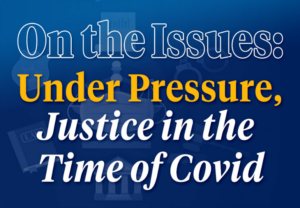Faith and Determination Drive Milwaukee Port’s Director
You could learn important things about Jackie Q. Carter just by looking at the shirt she wore for her turn at the center of an interview program at Marquette Law School on October 11, 2023.
“God don’t play about me,” the shirt said in bold letters.
That leads to concluding that Carter focuses much of her life on religion, that she is dedicated and serious about the things she pursues, and that she is forthright in offering her perspectives.
Carter was selected by Milwaukee Mayor Cavalier Johnson in January 2023 to be director of the Port of Milwaukee. She is the first woman and first Black person to hold that position and one of the very few women or Black people to hold a major executive position for any port in the United States.
Carter was the guest for a “Get to Know” session moderated by Derek Mosley, director of the Lubar Center for Public Policy Research and Civic Education at Marquette Law School. The new series is aimed at giving interesting people opportunities to talk about themselves and their work.
Carter showed during the hour–long program how intent she is on both religion and her work for the port. “If you ever heard me speak in public, you know how I always want to stop and honor God,” she said as the conversation began. “The foundation of who I am is my faith.”
Most of Carter’s childhood years were spent living near Washington Park on Milwaukee’s west side. Her family was on welfare at times, and she was raised primarily by her grandmother, who was the person who “founded me in the faith,” Carter said. Carter was a student at several Milwaukee– area colleges and universities, culminating in her receiving an MBA degree from Concordia University in Mequon, and she explored several career possibilities before going to work for Milwaukee city government, first in the city treasurer’s office and then in the budget office.
That led to her becoming the finance officer for the port, which is part of city government. And when the port director announced that he was retiring, he urged her to apply for the job. She and her husband prayed on it, she applied, and she was selected.
Carter is a determined booster of the port and its importance. The port is a driver of the economy not only of Milwaukee but of Wisconsin as a whole, she said. The port is, in effect, the landlord for shipping operations and other users of the 467 acres of land it owns, including the Summerfest grounds and the Discovery World museum. Mountains of salt, visible from the Lake Freeway that passes over port property, ismake up one of the best– known commodities that arrives in the part, but Carter described other products handled in large volumes, including steel and agricultural goods.
One area of growth for the port has been tourism, with increasing numbers of cruise ships docking in Milwaukee. Carter said the first cruise ship arrived in 2014. In 2023, there were 33 cruise ship arrivals, involving about 13,000 passengers.
Carter, who became a minister in 2022, sees the hand of God in leading her to her position with the port. “The Lord was laying that path out,” she said. And she is appreciative of people such as Mayor Johnson and port staff who have backed her success.
But she is also firm in asserting her own qualifications and accomplishments. “I earned the right to sit here in this chair,” she said. “Nobody gave it to me.”
Video of the “Get to Know” program may be viewed by clicking on the link below.

 “Everything is connected to everything.” That phrase, spoken by Milwaukee County District Attorney John Chisholm, summed up much of the content of a program on the impact of COVID-19 on Milwaukee County’s criminal justice system on Tuesday (Sept. 26, 2023) in the Lubar Center of Marquette Law School’s Eckstein Hall.
“Everything is connected to everything.” That phrase, spoken by Milwaukee County District Attorney John Chisholm, summed up much of the content of a program on the impact of COVID-19 on Milwaukee County’s criminal justice system on Tuesday (Sept. 26, 2023) in the Lubar Center of Marquette Law School’s Eckstein Hall.